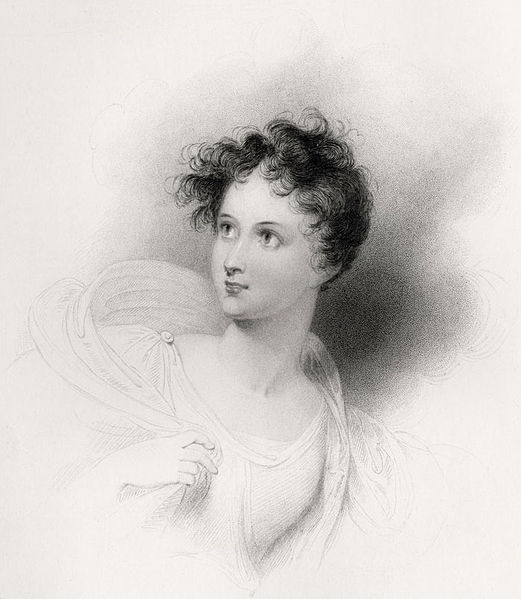 |
| Jonny Lee Miller as George Gordon Byron, 6th Baron Byron |
The opening scene shows the aftermath of Byron's death, his closest friends gathering together, making the decision of burning his memoir. It was revealed in the film how the real accounts of Byron were discovered (Annabella Noel Byron, nee Milbanke who lived to be 80 had a lot to do with the complete disruption of Byron's reputation, but you wouldn't know that just by watching the film).
I must say that the dramaturgs of the film was excellent in capturing all the details about Byron's life: the appearance of the grandeur Newstead Abbey, detailed all the way to the skull filled with wine! Miller also did a good job portraying the extremely self-conscious young lord: a effeminate youth, lame with a deformed right foot and features of Adonis; a narcissistic, yet insecure poet who's at war with himself.
 |
| the legendary Vanessa Redgrave as Lady Melbourne |
The order of events presented in the film was, to be honest, not quite truthful. I suppose that could be neglected as we are trying to get a general familiarity with this most controversial literary figure in European history, rather than scrutinizing scholarly accuracy.
The audience were shown the different aspects of Byron's literary and personal life almost bluntly. His most gossiped bi-sexuality was revealed from the beginning as we see his intimacy on his trip, with who appeared to be, I'm assuming, Robert Rushton the pageboy. Many a details are packed in the seemingly not-so-fast-paced film: we see Byron swimming in Tagus, rescuing the Turkish maiden who were to be executed by adultery (which actually happened later on during his second trip, but that's another story); we see the loyal valet Fletcher and Hobhouse's pen and paper that he packed so many of for the trip...before the fame hits.
The we were immediately introduced to the high society of Britain and the later half of Byron's life, including how his Hints From Horace proved unfavourable to the publishers while Childe Harold became an overnight hit; he became the national celebrity, having his portrait done, his peculiar diet because of his tendency of getting fat (inherited from his mother), etc, etc. And then there's the notorious affair with the then already married Lady Caroline Lamb, the infamous first known groupie of a modern superstar. Camila Powers' portrayal of Caro the "little volcano" fits the profile of a spirited woman of passion, with beauty like an antelope; maniac yet fragile. Her almost obscurely modern look set stark contrast against Annabella Milbanke, yet according to documentation, was quite truthfully reflected as what Lady Lamb was like.
Some of the choices the producers made for the characters haven't been entirely factual, the reason being, I suppose, to somewhat glorify Byron the poet and Byron the hero, and to romanticize his love life and scandals. Although I have to admit that the genius of the creative team successfully conveyed the character of the protagonist and summarized Byron's life story even though they went off the track a little about his relationship with Lady Milbanke, which was portrayed as though Annabella was the one who got starstruck, while in reality it had been Byron who initiated the proposal, got rejected for the first time, and then finally succeeded in 1815 after the two of them corresponding through post for about three years. Also, the appearance of Annabella Milbanke was adjusted in favour of the public eyes, Julie Cox being a slim and attractive Lady Milbanke, while historically she was supposed to be plain looking, somewhat voluptuous, though philosophical and insufferably bright.
The disappointing part of the production, if I may, is the lack of Byron's life pre-fame. His upbringing, experiences as a young boy in Cambridge, even his trauma at a young age, were missed out, as was his relationship with several important people including his mother, with whom Byron held a love-hate relationship till the end of his day, Edleston (his male lover since boyhood), etc. It's understandable that the main purpose of the movie is to show Byron's controversial society life and his public image, but I still believe it would have helped to have some exposure of his formative years. For a biopic, only one segment of the hero's life cannot make the audience see the whole entity. Also, the story missed out on Lady Oxford, Elizabeth Jane Scott, who had as strong an impact on Byron's life as any other mistresses he had, and her daughter Charlotte Harley, better known as Ianthe, to whom the first two cantos of Childe Harold was dedicated.
 |
| Lady Charlotte Bacon, nee Harley. Ianthe |
Of course, it's quite a challenge to shrink such a colourful character's life to a short TV movie with limited time and resources. Indeed Byron's descriptive style and enormous amount of letter correspondence with various individuals helped recreating his universe and fleshing out his character. On the other hand, we had been told since the beginning of the film, that most of his personal memoir had been destroyed in order to protect his reputation. The film left us wondering; Byron, thanks to his loyal friends, left us wondering who he truly was, for there's always something about him, just out of sight and remain mysterious.
The 2003 BBC production's biggest strength is its captivating and realistic details, as well as its impressive casting. Its shortcoming, though forgivable, had been a lack of completeness, representing only the later stages of Byron's life rather than from the beginning. This Byron fascinates and leaves you spellbound, yet these are still the illusion of the celebrity on the surface, not the roots of the problem.
(Go to this link to watch the whole film.)
No comments:
Post a Comment